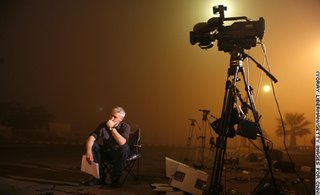
On CJR Daily, Lawrence Pintak writes a must-read analysis of cable news' ME crisis coverage that includes these trenchant observations:
...Hype abounded. "This could be World War Three!" more than one reporter was heard to say. The same dramatic images were endlessly repeated, as if on a loop. Rumor was elevated to fact -- and the networks seemed proud of it. One CNN promo showed an unedited sequence in which a nameless photographer told Anderson Cooper, in northern Israel, that there was a rumor of rockets on the way. Cooper then turned to the camera and authoritatively reported, "The police say more rockets are coming."So much for checking sources.
To be fair, there was also a fair share of solid, informed reporting. Yeoman's work has been done by Nic Robertson in Beirut, Matthew Chance in Gaza and Christiane Amanpour on the Israeli border, as well as CNN anchor and Beirut veteran Jim Clancy, NBC's Martin Fletcher on MSNBC and the handful of others who are based in, or spend significant time in, the region. The problem comes with those -- like Cooper -- who have parachuted into the Middle East with little grounding in the region, and the anchors back in the studios in London and the U.S. The errors of the uninitiated embeds in Iraq have been endlessly repeated...
...As is so often the case these days, celebrity reporters themselves frequently became the story. Anderson Cooper spent more time on-camera than the protagonists in the conflict, and MSNBC endlessly looped an outtake of Richard Engel repeatedly flubbing his on-camera standup as Israeli bombs fell behind him, much, I suspect, to his embarrassment. A failure to remain cool under fire is not something to be proud of.



